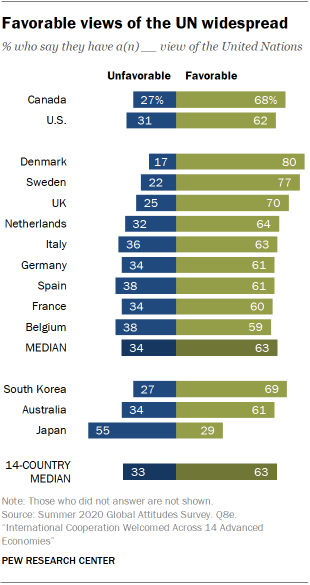
When asked about overall views of the United Nations, a median of 63% across 14 countries hold a favorable view of the organization, while 33% hold an unfavorable view.
In every European country surveyed, majorities are positive toward the organization, ranging from 59% in Belgium to 80% in Denmark. Majorities in Canada and the U.S. are also much more favorable toward the UN than negative.
Views are more mixed in the Asia-Pacific region. In South Korea, 69% have a favorable view of the UN, and 61% say the same in Australia. But only 29% have a favorable view of the UN in Japan, with 55% holding a negative opinion.
Positive views of the UN have remained generally consistent across many of the countries surveyed, but there are exceptions. Favorable opinions declined in several countries between 2019 and 2020. This is especially the case in South Korea (-13 points) and Japan (-18 points).
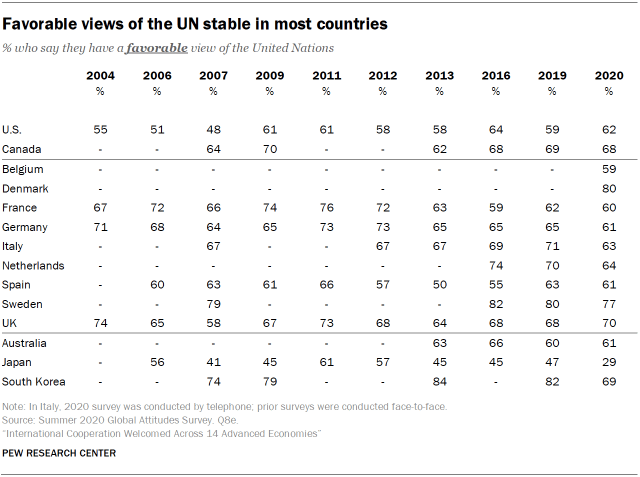
In the U.S., favorable views of the UN have ticked up 7 percentage points overall since the question was first asked in 2004, but sentiment is up 14 points since 2007, when only 48% of Americans held a positive view of the organization.
Social trust is tied to favorable views of the organization. Across all countries included in the survey, those who say that, in general, most people can be trusted are more likely to have favorable views of the organization. For example, in Germany, 70% of those who say people can be trusted view the UN positively, compared with 48% who say people cannot be trusted.
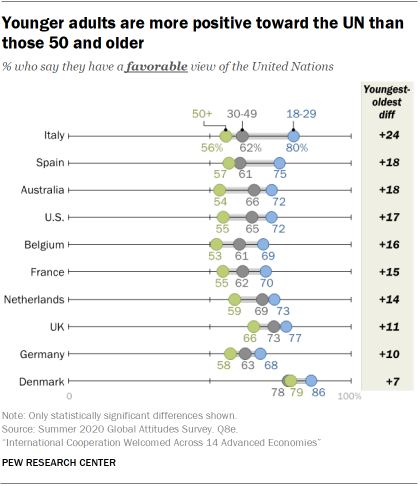
While more than half in each age group across all countries except Japan have a favorable view of the UN, in most countries surveyed, those ages 18 to 29 are more positive toward it than those 50 and older.
In Italy, for example, 80% of those ages 18 to 29 have a favorable view of the UN, compared with 56% of those 50 and older, a difference of 24 percentage points. Double-digit differences between the youngest and oldest age groups are also present in Spain, Australia, the U.S., Belgium, France, the Netherlands, the UK and Germany.
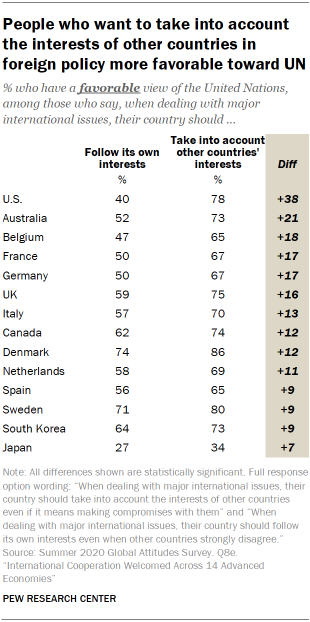
Those who say their country should take into account the interests of other countries when dealing with major international issues are more likely to have a favorable view of the UN than those who say their country should follow its own interests. This difference is present across all 14 countries included in the survey, but it is largest in the U.S. Over three-quarters of Americans who prefer taking other countries’ interests into account have a favorable view of the UN, compared with 40% of those who say the U.S. should follow its own interests.
World Health Organization gets positive ratings for its handling of COVID-19
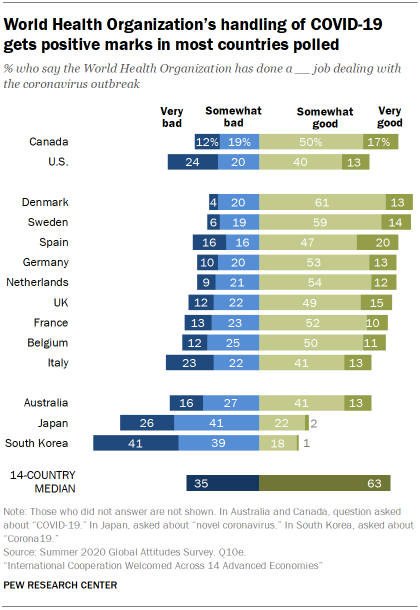
When asked about the World Health Organization’s handling of the coronavirus outbreak, a median of 63% say the organization has done a somewhat or very good job dealing with the pandemic. Positive assessments are especially strong in Denmark (74% somewhat or very good) and Sweden (73%).
A median of 35% say the organization has done a bad job dealing with the outbreak. Two-thirds or more in South Korea (80%) and Japan (67%) say the WHO’s handling of the coronavirus outbreak is somewhat or very bad. Views are particularly negative in South Korea, where 41% think the WHO has done a very bad job dealing with the outbreak.
In the U.S., 44% say the WHO has done a somewhat or very bad job handling the pandemic, while 53% believe it has done a somewhat or very good job.
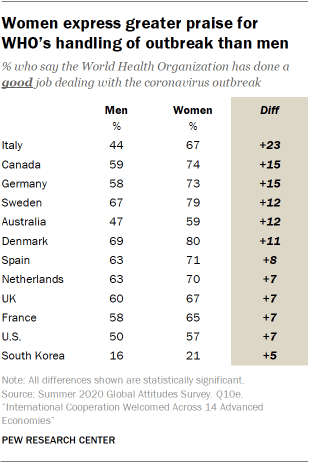
In seven countries surveyed, people who place themselves on the left of the ideological spectrum are more likely than those on the right to say the WHO has done a good job dealing with the coronavirus outbreak by double digits. In the U.S., there is a 34 percentage point difference between those on the left who say the organization has done a good job and those on the right (71% vs. 37%, respectively).
And in nearly every country polled, women are more likely than men to say the WHO has done a good job dealing with the outbreak. This difference is largest in Italy: Women are 23 points more likely than men to have a positive view of the WHO’s role in the pandemic (67% vs. 44%, respectively).
Previous Pew Research Center findings have shown that women are also more likely than men to say their lives have changed because of COVID-19.




